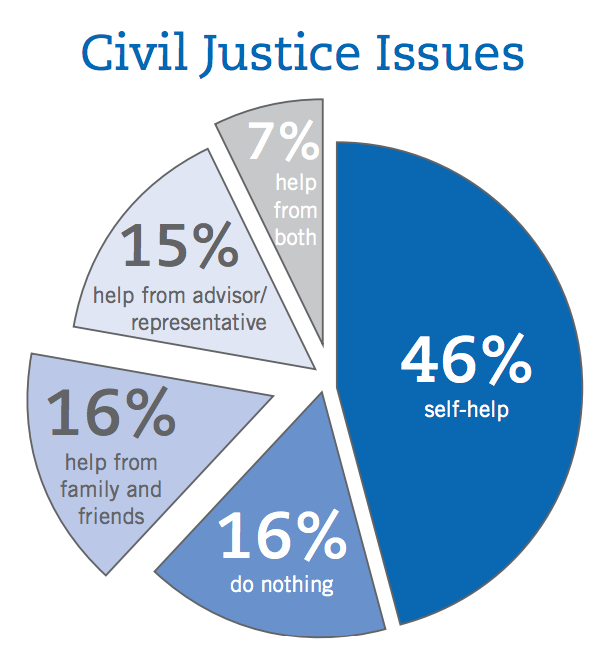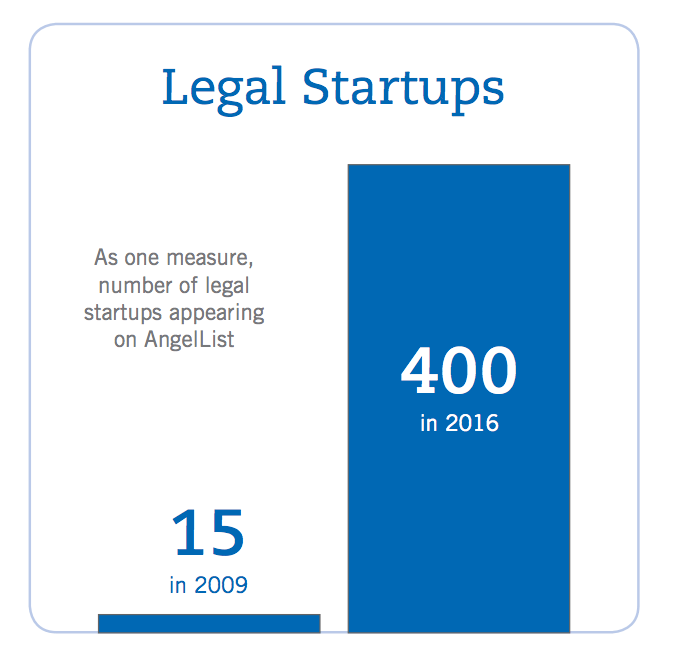In an effort to understand the rapidly-changing legal profession, the American Bar Association (ABA) established the 30-member Commission on the Future of Legal Services in 2014.
The Commission spent two years researching and documenting the challenges facing the profession and, in particular, whether traditional delivery models were up to the task of meeting the public’s legal needs.
At the ABA annual meeting earlier this month in San Francisco, the Commission presented its 96-page Report on the Future of Legal Services in the United States. It’s a fascinating report that I’m sure we’ll write about in more detail in future weeks.
Right now, though, we wanted to highlight some of the extraordinary facts and statistics highlighted in the report. Here are the five that amazed us the most.
Improve the efficiency of your legal practice by going paperless. Get started with our free guide >>
#1 Fewer than a quarter of people facing civil justice issues obtain professional help
More often than not the public does not get professional legal assistance with legal problems.
The report cites research titled “Accessing Justice in the contemporary USA” that found that, of those facing a legal issue, only 22% would seek help from a professional advisor or representative. Most would attempt to handle the problem alone, or with the support of friends and family. Many would do nothing at all.

When these respondents were asked why they had not sought the assistance of a lawyer, many replied that they had not appreciated that their problems were legal in nature or that they had legal solutions. That so many legal problems go untouched by the legal profession, the report notes, shows great potential for lawyers to assist more people:
“Although the study did not delve into the severity of the legal problems people confront and left open the question of how many would benefit from formal assistance (including from a lawyer), the research does demonstrate what some experts refer to as a latent legal market—that is, a market for legal services that is currently untapped.”
#2 Lawyers provide on average seventy hours of pro bono per year
For many years, the report’s authors write, lawyers have sought to address the gap in access to justice for those unable to pay via pro bono initiatives. The vast majority of lawyers (80 percent) devote time to pro bono, with an average of 70 hours per year being donated by those who do so.
However, despite this professional commitment to volunteer work, the report notes that, without other changes, this effort will not be sufficient to meet the nation’s growing legal needs:
“Even with the profession’s deep commitment to pro bono and further innovations, pro bono work alone will not resolve the tremendous need for civil legal representation. Data shows that annually ‘U.S. lawyers would have to increase their pro bono efforts … to over nine hundred hours each to provide some measure of assistance to all households with legal needs.’”
#3 93 percent of mid-size and large firms use some form of non-hourly billing
The report doesn’t hold back in its conclusions that the current way of doing business in many law firms — solo, one-on-one lawyering, billed on an hourly basis — “constrains innovations that would provide greater access to, and enhance the delivery of, legal services.”
The report does find, though, that the billable hour is being challenged to some extent by alternative fee arrangements. The authors write:
“In recent years, however, [business] consumers have become aware of and started to more regularly demand an alternative fee arrangement (AFA). These AFAs include fixed pricing for discreet services, flat fees, contingency fees, other fee arrangements tied to matter related outcomes, and hybrids of AFA and traditional hourly billing.”
Alternative fee arrangements are much more likely in large and midsize firms than in smaller firms, however. Despite some notable efforts to the contrary, such as the SmartLaw Flat Fee Legal Service established by the Los Angeles County Bar Association, few small firms offering consumer legal services regularly offer flat fees.
#4 There were 400 legal startups launched in 2016
Entrepreneurs have begun to see opportunities to provide legal services more efficiently, and to support traditional law firms to do more with the resources they’ve got. These “other legal services” have expanded rapidly in recent years — in 2015/16, 400 legal startups appeared on AngelList (a directory of new companies), compared to just 15 in 2009.

Investors, too, see big opportunities for the legal services market to change. In 2012, legal service technology companies received $66 million in outside investments, but by the end of 2013 that figure was $458 million — and it’s estimated to have been growing since.
#5 The annual revenue of the online legal services industry is projected to grow to $5.9 billion by 2019
The new providers entering the legal market are shaking things up. Some provide services directly to consumers, but most provide their services to lawyers and law firms. This latter group make legal work more efficient, streamline and automate many tasks, and enable lawyers to outsource time-consuming activities.
The report cites U.S. Census data that shows that, since 1998, law office employment has shrunk while the category “all other legal services” has grown eight and a half percent annually and 140 percent over the period.
In fact, the specific category of businesses referred to as “online legal services,” which simply did not exist a decade ago, was worth $4.1 billion a year in 2014, and is estimated to grow rapidly to at least $5.9 billion a year by 2019.
Save your law firm time and money by going paperless. Learn how with our free ebook >>







